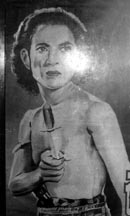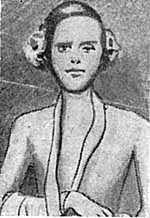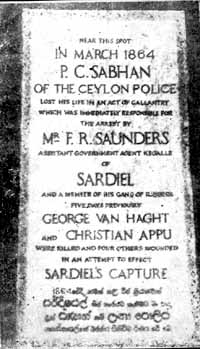 known as the Robin Hood of Sri Lanka. Sentence of death was executed on this
bandit believed to be the most daring brigand that ever lived in this country on
May 07, 1864.
known as the Robin Hood of Sri Lanka. Sentence of death was executed on this
bandit believed to be the most daring brigand that ever lived in this country on
May 07, 1864.
by W.T.A. leslie Fernando - Sunday Observer May 5 2002
When you pass Kegalle on the Colombo-Kandy road
there is a mighty rock near Mawanella called Utuwankande, where once lived
Saradiel  known as the Robin Hood of Sri Lanka. Sentence of death was executed on this
bandit believed to be the most daring brigand that ever lived in this country on
May 07, 1864.
known as the Robin Hood of Sri Lanka. Sentence of death was executed on this
bandit believed to be the most daring brigand that ever lived in this country on
May 07, 1864.
Deekirikevage Saradiel was born on March 25, 1832. His father was a tobacco merchant from Haldanduwana, Dankotuwa whose business made him to frequent the Kegalle District. For some time he lived with one Pitchohamy near Utuwankande. Saradiel was the eldest son born to them.
The boy was sent to Illukgoda Temple for his education. At the temple school, Saradiel proved to be intelligent but he used to quarrel constantly with other students. His studies came to an abrupt end when he was arrested by the Police and severely dealt for assaulting a rich boy a close relative of the village Vidane.
Saradiel even in his young days formed a gang and began to defy the law. There is a legend that Saradiel got hold of a rich merchant from Kandy called Bawa who fleeced the villagers by selling glittering wares at exorbitant prices, cut half of Bawa's mustache, took much of his money and wares and distributed them among the poor villagers. Soon Saradiel's name came to be associated with various thefts in the area but he managed to escape the hands of the law.
Subsequently Saradiel left the village and secured employment as a barrack boy in Colombo. At the barracks he came into contact with soldiers and learned to use guns and other weapons. After some time Saradiel left this place carrying some weapons and valuables.
Saradiel came back to Utuwankande and began to associate with the notorious criminals in the area. He chose a career of highway robbery and soon daring exploits of Saradiel came to known in the district. He is said to have murdered and robbed a rich Natakoti Chettiar and was arrested. But as there was no evidence to prosecute Saradiel, he was discharged. However as a consequence of robbing Molligoda Walauwa, a warrant was issued for the arrest of Saradiel.
Saradiel left Utuwankande area to evade arrest and went to his father who was at Chilaw at the time. His father refused shelter to the ruffian son. Saradiel decided to return to Utuwankande - but again to defy the law.
On his return Police detected Saradiel at Pillawatte near Negombo. In the struggle that ensued Saradiel stabbed the Police informant before he was arrested. The man later died of the wounds and Saradiel was taken to Hulftsdorp to be tried for murder. But Saradiel managed to escape from prison before the date of the trial.
He was soon re-arrested at Utuwankande. When the officers were taking Saradiel to Colombo they rested the night at Mahara and supervision was somewhat relaxed underestimating the bandit. Saradiel making use of this opportunity managed to escape with handcuffs on.
Saradiel came back to Utuwankande and formed a gang of robbers among whom Hawadiya, Bawa, Sirimale, Kirihonda, Suwanda and Mammalay Marikkar were the most noted. Their centre of activity was Utuwankande where jungles around it provided them a safe hideout. This lawless band waylaid carriages and coaches and robbed people of their belongings.
Contractors taking goods to Kandy and outlying stations passing Utuwankande area sought the protection of armed escorts and even then on some occasions they were attacked and guns and ammunition were stolen. Terrified passengers related horrifying stories of the attacks of Saradiel and his exploits came to be known throughout the country. Traffic on the Kandy road was often interrupted due to this plundering in the environs of his habitat.
Saradiel and his gang became such a terror in the district that the forces in Kegalle, Mawanella and Hingula Police stations were strengthened. The AGA Kegalle and the SP instructed Ratemahatmayas to get the help of villagers to arrest Saradiel. While the authorities were planning to arrest Saradiel, his daring deeds spread to Rambukkana, Polgahawela and Kurunegala areas.
In Galagedera, Saradiel had killed and Arab who had come to sell horses and snatched Rs. 500, a mighty sum at that time. Two traders were killed on the spot on suspicion that they were Police spies. By now the name of Saradiel had become a legend and people shrudded to hear of it.
Once the villagers and the Police surrounded Saradiel at his mother's house. Saradiel shooting through a hole in the wall killed two people. In the confusion that followed Saradiel escaped and was reported to have fled to the jungles of Matale.
Meanwhile Sirimale, one of Saradiel's band defected and wanted Saradiel to be arrested. He on the sly got Saradiel to take refuge in a two-storeyed house at Mawanella. On a tip off, a Police party surrounded the house. They found Saradiel there with Mammalay Marikkar.
Sgt. Ahamath Immediately fired at Saradiel and Saradiel was wounded before he could open fire in retaliation. But Mammalay Marikkar shot constable Shaban dead. Sgt. Ahamath who just escaped death from another shot from Mammalay Marikkar stood guard outside the house with a loaded revolver to prevent their escape. Just then AGA Kegalle F.R. Saunders arrived with a detachment of Ceylon Rifles. Now both of them found further resistance futile and surrendered.
Saradiel and Mammalay Marikkar were tied with strong cords and were taken to Kandy. They were tried at Kandy azzises by an English speaking Jury before Justice Thompson. The Jury found them guilty and both were sentenced to death. In prison awaiting the sentence Saradiel genuinely repented for his past.
Richard Morgan, the crown advocate who prosecuted the case against Saradiel and Mammalay Marikkar, in his report to the Governor commended the zeal and bravery of the two Police officers who took part in the arrest of Saradiel. Constable Shaban who died while arresting Saradiel on March 21, 1864 was the first Police officer in our country to die in action. Accordingly on March 21, Police heroes are commemorated every year in Sri Lanka.
Saradiel and Mammalay Marikkar walked to the gallows on May 7, 1864. Thousands flocked to the streets of Kandy on that day to have a glimpse of Saradiel. They expected him to be a sturdy built ferocious looking man but were surprised to see a slim figure with a pleasant face. Mammalay Marikkar had no courage to speak anything before execution. Saradiel addressed the crowd as a man who had gone astray and advised the gathering to take a lesson from his fate.
Although Saradiel was a terror around the Kegalle District, he never robbed the poor. A gambler he once got the money he needed from a man who was taking the dowry for his daughter. Saradiel asked the man to come to the same spot on the next day. They met at the appointed time and saradiel returned the money twofold and another share as a gift from him.
The money Saradiel robbed from the rich, he often distributed generously among the poor. So Saradiel came to be known as the "Robin Hood of Sri Lanka".
(The writer is a former High Court Judge)

